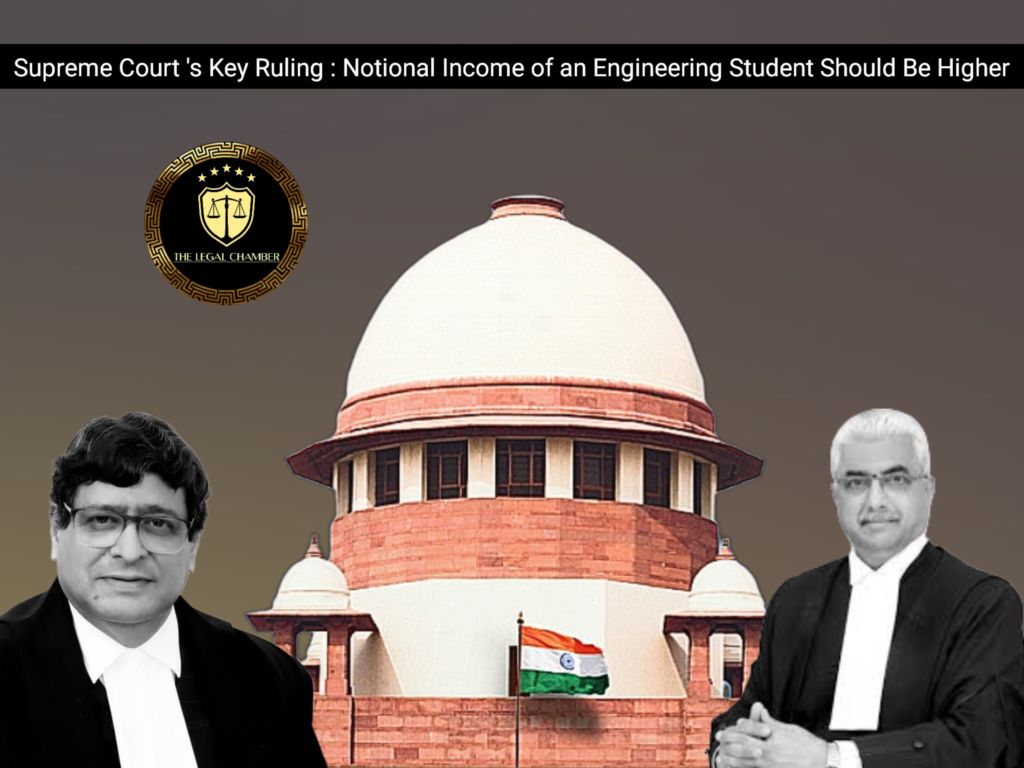
The Supreme Court modified the contributory negligence apportionment to 20% on the claimant, 50% on the car driver, and 30% on the bus driver. It enhanced compensation by revising the notional income calculation for an engineering student and reinstated attendant charges, emphasizing just compensation for 100% disability.
Facts Of The Case:
On January 7, 2017, the appellant, a 20-year-old engineering student, was riding a motorcycle with a friend on the pillion. A car ahead, driven by respondent no. 2, suddenly applied its brakes on the highway because the driver’s pregnant wife felt a vomiting sensation. This caused the appellant to collide with the rear of the car and fall onto the road. Subsequently, a bus, insured by respondent no. 1, which was coming from behind, ran over the appellant. The devastating accident resulted in the amputation of the appellant’s left leg from the waist down during treatment. The appellant filed a claim petition before the Motor Accident Claims Tribunal, which awarded a compensation of ₹73,29,653 after deducting 20% for his contributory negligence, holding the bus insurer solely liable. Both parties appealed to the Madras High Court, which reapportioned negligence at 40% (car driver), 30% (bus driver), and 30% (appellant) and reduced the attendant charges, thereby lowering the total compensation. The appellant then approached the Supreme Court, challenging the High Court’s order on the grounds of erroneous negligence apportionment and inadequate compensation.
Procedural History:
The appellant initially filed a claim petition before the Motor Accident Claims Tribunal, which awarded a compensation of ₹91,62,066. After deducting 20% for the appellant’s contributory negligence, the payable amount was set at ₹73,29,653, with the entire liability imposed on the bus insurer. Dissatisfied, both the bus insurer and the appellant filed appeals in the Madras High Court. The High Court’s impugned order partly allowed the insurer’s appeal by reducing the attendant charges and reapportioning negligence at 40% (car driver), 30% (bus driver), and 30% (appellant). It also partly allowed the appellant’s cross-objection by granting future medical expenses. This resulted in a reduced compensation of ₹58,53,447. The appellant then pursued the matter further by filing a special leave petition in the Supreme Court, which granted leave and led to the present civil appeal.
READ ALSO :Supreme Court: Jail Overcrowding Can’t Be a Ground for Granting Bail in Heinous Crimes
Court Observation:
The Supreme Court observed that the genesis of the accident was the car driver’s sudden and unreasonable braking on a highway without any warning, making him primarily liable. It concurred with the finding that the appellant was contributorily negligent for not maintaining a safe distance and driving without a license, but found the High Court’s 30% apportionment excessive, reducing it to 20%. The Court further held that the notional income for a young engineering student with a bright future must be realistically assessed at ₹20,000 per month, not minimum wages, to ensure just compensation. It also ruled that the Tribunal’s calculation of attendant charges for lifelong care was rational and should not have been reduced by the High Court without cogent reasons, and enhanced compensation for loss of marital prospects.
Final Decision & Judgement:
The Supreme Court allowed the appeal in part. It set the total compensation at ₹1,14,24,066. After deducting 20% for the appellant’s contributory negligence, the final payable amount was adjudged as ₹91,39,253, to be paid with 7.5% annual interest from the claim petition’s filing date. The liability was apportioned between the insurers: the car insurer (respondent no. 3) was held liable for 50% of the compensation amount, and the bus insurer (respondent no. 1) for 30%, with the directive that the sum be paid to the appellant within four weeks. All pending applications were disposed of accordingly.
Case Details:
Case Title: S. Mohammed Hakkim Vs. National Insurance Co. Ltd. & Ors. Citation: 2025 INSC 905 Appeal Number: [Arising out of Special Leave Petition (Civil) No(s). 28062-63 of 2023] Date of Judgement: July 29, 2025 Judges/Justice Name: Justice Sudhanshu Dhulia & Justice Aravind Kumar
Download The Judgement Here